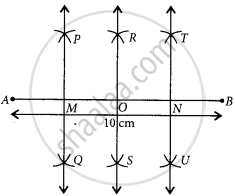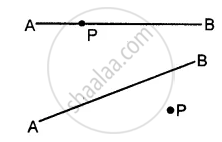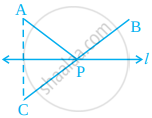Advertisements
Advertisements
Question
Draw a line segment of length 10 cm. Divide it into four equal parts. Measure each of these parts.
Solution

Steps of construction:
(i) Draw a line segment AB = 10 cm.
(ii) With A and B as centres and radius more than `1/2 (AB)`, draw arcs on each side AB, these arcs cuts each other at R at S.
(iii) Join RS, which cuts AB at a point O.
(iv) Now, with centres A and O and radius more than `1/2 (AO)`, draw arcs on each side of AB, these arcs cuts each other at P and Q.
(v) Join PQ, which cuts AB at M.
(vi) Similarly, with centres B and O and radius more than `1/2 (BO)`, draw arcs on each side of AB, these arcs cuts each other at T and U.
(vii) Join TU, which cuts AB at N. Thus the measurement of each i.e., AM, MO, ON and NB is equal to 2.5 cm.
APPEARS IN
RELATED QUESTIONS
In each of the following, draw perpendicular through point P to the line segment AB :
(i)

(ii)

(iii)

Draw a line segment of given length and construct a perpendicular bisector to line segment using scale and compass
7 cm
Only one perpendicular bisector can be drawn to a given line segment.
It is possible to draw two bisectors of a given angle.
In figure, the point C is the image of point A in line l and line segment BC intersects the line l at P.
(a) Is the image of P in line l the point P itself?
(b) Is PA = PC?
(c) Is PA + PB = PC + PB?
(d) Is P that point on line l from which the sum of the distances of points A and B is minimum?
Draw a line segment of length 7 cm. Draw its perpendicular bisector, using ruler and compasses.
Copy figure on your notebook and draw a perpendicular to l through P, using (i) set squares (ii) protractor (iii) ruler and compass. How many such perpendiculars are you able to draw?
Bisect ∠XYZ of figure.
Draw the perpendicular bisector of `overline"XY"` whose length is 10.3 cm.
- Take any point P on the bisector drawn. Examine whether PX = PY
-
If M is the midpoint of `overline"XY"`, what can you say about the lengths MX and XY?
Draw a line segment of length 12.8 cm. Using compasses, divide it into four equal parts. Verify by actual measurement.
